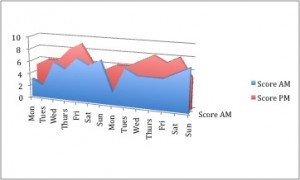

So you think you are in the wrong job. You awake each morning with a feeling of dread. You would rather stay in bed, and your get up and go has got up and went. The thought of going to the dentist fills you with more joy than heading off to the office.
Well, these might be good indicators that it is time for a change of job. However, it also might be indicating something else e.g. depression or simply a lack of meaning. So if you are pretty sure that you are not suffering from depression or some other life-altering situation, here is one way to find out if it is perhaps that job after all.
Our moods fluctuate on a daily basis. Some people even hourly or at different times of the day. So the first step in deciding if there is an issue with your current occupation or job is to get a baseline reading of your daily happiness index.
A happiness index is a score that you give to yourself on the level of happiness that you are feeling at that point in time. It is on a scale of 1 to 10. 1 being not happy at all and 10 being extremely happy. A 5 would indicate a feeling of indifference.
So what you need to do is, twice a day at roughly the same time take a self assessment of your level of happiness. I would recommend that you do this at around 10am and 3pm so it is not influenced by just arriving at work or getting ready to leave. Do this for a period of two weeks and include the weekends for comparison. At the end of the two-week period graph the daily results using a program like Excel. Take an average score of the weekdays. To do this, add up all your morning scores and divide by 10, and do the same for the afternoon scores.
Your graph might look something like this:


The first bit of information you will be able to glean from this is: are you a morning or afternoon person? If your morning scores are lower give some thought to the following:
• Are your morning activities different from your afternoon activities?
• If there is a differential between the two scores that is greater than 3, why is this. Are you perhaps doing admin work in the morning, but in interactive meetings in the afternoon or visa versa. If this is the case you can identify the activities you dislike and move them to a more suitable time. i.e. Monday morning might not be the best time to do tasks you do not like (unless you have a strong desire to get them out of the way).
• If your scores differ between afternoon and morning it could also be an indication that it is more of a task issue than the actual job itself.
Now add your morning and afternoon averages together and divide by 2 to see what your average job happiness is. If your score is way below 5 (indifference), then it’s time to start doing some thinking. Here are 5 points to ponder if you have a below 5 score.
• What is it about your current job that you do not like?
• Can you associate the feeling with any particular event or person at work? • If you could change anything in your daily job, what would it be?
• If you made this change, would you role be more fulfilling and increase your level of happiness?
• When last did you take a holiday? Could you be suffering from burnout?
For interest compare your weekend scores with your weekday averages. If there is a large difference here, you are wasting a lot of your waking hours being in an unhappy position.
The aim of the happiness index is to get you thinking about what is making you happy or unhappy at work. The goal is to move you from a subconscious feeling of discontentment to a conscious awareness of when and why you are not satisfied or unhappy with your job. In doing so you will empower yourself with the ability to make a choice and change the elements that are causing unhappiness. Take back control of your situation. Create your life.


Kevin, again you have successfully raised our understanding of an issue that many people battle with at times in their lives and careers. Well done!
Your blending of a scientific approach to an emotional issue is refreshing and may resonate well with many people.
One way that has helped me deal with periodic and/or recurring feelings of depression or lack of enjoyment at work is to define our personal ‘energy givers’ and ‘energy takers’. Specifically, identifying activities or interactions that feel like they give us energy versus ones that feel like they have depleted our sense of energy once we have completed the task.
Your analytical approach could work well here too, where you basically score each repeated primary or significant meeting or activity on your calendar for a 2 week period. Then look at the various activities you do on a regular basis and gauge if the energy score is consistently high, low or always different.
After gaining a sense of what gives and takes your energy, your are able to make much more informed decisions about what type of job would give you a net increase in energy at the end of the day/week/year rather than leaving you with a net deficit which could lead to depression or lack of fulfillment .
Keep up the good work, you are helping more people than you may realize.
Regards,
GK
Hey Gary. Thanks for your great comments and insights. You always provide some great food for thought too. I like your line of thinking. Energy balance is so important.
Now you can track your daily happiness with an iPhone app called Mappiness. It pings you at different times of the day for you to input your happiness index. Brilliant 🙂 I’m about a 7 right now. http://www.mappiness.org.uk/